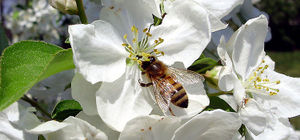Ecosystem Services: Difference between revisions
No edit summary |
|||
| Line 11: | Line 11: | ||
=== Supporting services === | === Supporting services === | ||
: | :include, but are not limited to, [[Nutrient cycling]], primary production, soil formation, habitat provision and pollination. | ||
=== Provisioning services === | === Provisioning services === | ||
Revision as of 20:30, 2 May 2019
Ecosystem services are the many and varied benefits that humans freely gain from the natural environment and from properly-functioning ecosystems.

Denfinition
Per the 2006 Millennium Ecosystem Assessment (MA), ecosystem services are "the benefits people obtain from ecosystems". These benefits may be as broad as the oxygen we breathe to the simple joy one experiences when walking past a garden. Because they are so broad and overlapping, the term "ecosystem services" has been defined into select categories to further describe which particular ecosystems or habitats provide which service. While a small garden may produce oxygen, the services yielded by such a small system would likely come from the foods produced and thereby consumed, rather than the minute amount of oxygen a few garden plants produce.
Four categories
The Millennium Ecosystem Assessment (MA) report 2005 defines Ecosystem services as benefits people obtain from ecosystems and distinguishes four categories of ecosystem services, where the so-called supporting services are regarded as the basis for the services of the other three categories.The more details about the four services shows in Essential ecosystem services.
Supporting services
- include, but are not limited to, Nutrient cycling, primary production, soil formation, habitat provision and pollination.
Provisioning services
- Food, whether from a massive corn farm or a small community garden.
- Materials, such as lumber, lye, fertilizer or compounds used to create medicine
- Water, which can be extracted from tree sap or simply purified from a particular natural filtration system
- Energy, the burning of natural gas, coal and oil, all of which came from ancient trees, can be considered a service
Regulating services
- carbon sequestration and climate regulation
- waste decomposition
- purification of water and air
Cultural services
- Cultural works such as art, sculptures, paintings, writings
- Spiritual or religious events
- Education
- Therapy
Other Use
Economics
There are questions regarding the environmental and economic values of ecosystem services. Although environmental awareness is rapidly improving in our contemporary world, ecosystem capital and its flow are still poorly understood, threats continue to impose.
Management and police
Although monetary pricing continues with respect to the valuation of ecosystem services, the challenges in policy implementation and management are significant and multitudinous.
Maintain Biovdiversity
Ecosystem not only provides all kinds of biological breeding ground, the more important is provides the necessary conditionsfor for biological evolution and biodiversity.
References
[1]Millennium Ecosystem Assessment (MA). 2005. Ecosystems and Human Well-Being: Synthesis
[2]"Conservation of ecosystem services". Adam Purcell. Archived from the original on 29 November 2014
[3]Raudsepp-Hearne, C. et al. 2010. Untangling the Environmentalist's Paradox: Why is Human Well-being Increasing as Ecosystem Services Degrade? Bioscience 60(8) 576–589.
[4]Ostrom, E. 1990. Governing the Commons: The Evolution of Institutions for Collective Action. Cambridge University Press, Cambridge.
[5]MOlnar, Michelle; Clarke-Murray, Cathryn; Whitworth, Jogn & Tam, Jordan. " 1 December 2014.